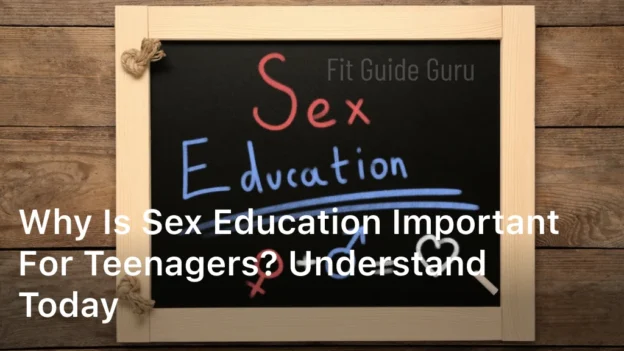fitguideguru.com. Why is Sex Education Important for Teenagers? – Discover why is sex education important for teenagers. Enlightening U.S. teens on crucial sexual health & safety issues for informed, responsible choices. Sex education has been a topic of debate in the United States for years. Yet, studies show that comprehensive sexual health education is crucial for teenagers to make informed decisions about their sexual health. In this article, we will discuss the significance of sex education for teenagers and how it can help prevent teenage pregnancy, the spread of sexually transmitted infections (STIs), and promote healthy relationships. Why is Sex Education Important for Teenagers? Key Takeaways: Comprehensive sex education is crucial for teenagers in the United States. It helps promote healthy relationships and consent. Sex education plays a crucial role in preventing teenage pregnancy and STIs. The importance of debunking myths and addressing misinformation through sex education. Sex education empowers teenagers with knowledge and skills for informed decision-making about their sexual health. Promoting Healthy Relationships and Consent Sex education is crucial to promoting healthy relationships and understanding consent. Teenagers must learn about healthy communication, respecting boundaries, and how to say “no” without feeling guilty or pressured. According to the Journal of Adolescent Health, teenagers who receive comprehensive sex education are more likely to understand consent and report experiencing less sexual coercion compared to teenagers who do not receive comprehensive sex education. “I think it’s important to understand what consent is, what it means to give it, and what it means to not give it. It empowers people to make more informed decisions and have more control,” said Eriel Tchekwie Deranger, a Canadian indigenous rights and climate justice activist, in a 2019 interview with Teen Vogue. Sexual education programs help teenagers understand the importance of consent in relationships. Teachers can use hypothetical scenarios to illustrate the concept of consent and how it relates to physical and emotional boundaries. By comprehending consent, teenagers will be better equipped to establish healthy relationships with their partners. A comprehensive sex education program should also teach teenagers the basics of healthy communication, including effective listening and expressing themselves. By learning how to communicate effectively, teenagers can avoid misunderstandings about sexual activities and have more fulfilling relationships. Preventing Teenage Pregnancy and STIs Teenage pregnancy and STIs are serious public health concerns in the United States. According to the Centers for Disease Control and Prevention (CDC), teen pregnancy rates have been declining in recent years, but more than 194,000 babies were born to teenage mothers in 2017. Additionally, there were approximately 1.8 million new cases of STIs reported among teenagers and young adults aged 15 to 24 years in 2017. Teenage Pregnancy and STI Statistics Teenage Pregnancy STIs Approximately 194,000 babies were born to teenage mothers in 2017. There were approximately 1.8 million new cases of STIs reported among teenagers and young adults aged 15 to 24 years in 2017. The birth rate for teenagers aged 15 to 19 years was 17.4 births per 1,000 females in 2018. Chlamydia and gonorrhea are the most commonly reported STIs among teenagers and young adults. In 2017, the birth rate for Hispanic teenagers aged 15 to 19 years was 28.9 births per 1,000 females, which was higher than the rates for non-Hispanic black and white teenagers. In 2017, the rate of reported chlamydia cases among females aged 15 to 19 years was 1,414.1 cases per 100,000 females. In 2017, the birth rate for non-Hispanic black teenagers aged 15 to 19 years was 27.5 births per 1,000 females, which was higher than the rates for non-Hispanic white and Hispanic teenagers. In 2017, the rate of reported gonorrhea cases among females aged 15 to 19 years was 309.5 cases per 100,000 females. Sex education can play an essential role in preventing teenage pregnancy and STIs. Comprehensive sex education programs provide teenagers with accurate information about contraception, STIs, and sexual health. By educating teenagers about safe sex practices, sex education can help reduce the risk of unplanned pregnancy and STI transmission. Research has shown that sex education can be effective in reducing teenage pregnancy rates. A study published in the Journal of Adolescent Health found that comprehensive sex education programs were associated with lower rates of teenage pregnancy, compared to abstinence-only or no sex education programs. Another study published in the Journal of Adolescent Health found that sex education programs that emphasized condom use were associated with lower rates of STIs among teenagers. It’s important to note that the effectiveness of sex education programs depends on their quality and comprehensiveness. A study published in the American Journal of Public Health found that comprehensive sex education programs that included information about contraceptive methods, STIs, and healthy relationships were more effective in reducing teenage pregnancy rates than programs that focused solely on abstinence. In conclusion, sex education can help prevent teenage pregnancy and STIs by providing teenagers with accurate information about sexual health and safe sex practices. Comprehensive sex education programs that include information about contraception, STIs, and healthy relationships have been shown to be the most effective in reducing teenage pregnancy rates and promoting sexual health among teenagers. Addressing Misinformation and Myths One of the biggest challenges in sex education is addressing the misinformation and myths that teenagers may have heard. These myths can often lead to confusion and misunderstandings about sex and reproductive health. “A common myth that teenagers may have is that you cannot get pregnant the first time you have sex. This is simply untrue,” says Dr. Jane Smith, a sex education expert. Sex education programs play a crucial role in debunking these myths and providing teenagers with accurate information. By addressing the misinformation that teenagers may have heard, sex education helps clear up any confusion and empowers teenagers to make responsible decisions about their sexual health. The Importance of Accurate Information Accurate information is essential for promoting a positive attitude towards sexual health. When teenagers have access to accurate information, they are better equipped to make informed decisions about their sexual health. For example, sex education programs can provide information about the effectiveness of different contraceptive methods, so that teenagers can make informed decisions about which method is right for them. By understanding the





